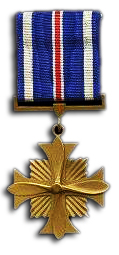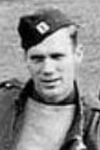Distinguished Flying Cross (DFC)
The Distinguished Flying Cross was instituted on July 2nd 1926. The very first one was awarded to Captain Charles A. Lindbergh for his flight in the Spirit of St. Louis, the first Transatlantic solo flight in 1927. The first US Navy pilot to be awarded the DFC was Commander E. Byrd for his flight to the North Pole and back in 1926. Amelia Earhart was the first female pilot to receive the DFC and the first and only civilian pilot to be awarded. By special Act of Congress, the Wright Brothers retroactively received a Distinguished Flying Cross.
The decoration could be awarded for actions after April 6th, 1917.
It could be awarded “to any person, while serving in any capacity with the Air Corps of the Army of the United States, including the National Guard and the Organized Reserves, or with the United States Navy, since April 6th, 1917, has distinguished, or who, after approval of this Act, distinguished himself by heroism or extraordinary achievement while participating in an aerial flight. The performance of the act of heroïsme must be evidenced by voluntary action above and beyond the call of duty. The extraordinary achievement must have resulted in an accomplishment so exceptional and outstanding as to clearly set the individual apart from his comrades or from other persons in similar circumstances. Awards will be made only to recognize single acts of heroism or extraordinary achievement and will not be made in recognition of sustained operational activities against an armed enemy”. During war time the decoration could also be awarded to members of the Armed Forces of friendly foreign forces that served with the United States.
The original design was from Mr. Arthur E. Dubois and Miss Elizabeth Will.
It is composed by a Bronze Cross Patee with on it a four-bladed propeller, with between each two blades of the propeller, five rays between the arms of the cross.
The ribbon is blue with on both sides a white stripe. In the centre one can find a red stripe with two smaller white stripes on each side.
Only one medal was received. When further Distinguished Flying Crosses were awarded, the recipient received either a Bronze Oak-Leave clusters for Army and Air Force and Gold Stars for Navy personnel. For every fifth bronze Oak-Leave cluster or Gold Star, a Silver Oak-Leave cluster or Silver Star was received. Oak-Leave clusters and Stars were to be worn on the ribbon of the first medal. US Navy or US Marines Corps pilots also could receive a “V”-pin for on the ribbon which denotes valour in combat action.

| Name | Date of birth | Date of death | Awards | |
|---|---|---|---|---|
| Fairchild, Muir Stephen | 02-09-1894 | 17-03-1950 |       more more | |
| Farrow, Wiliam Glover | 24-09-1918 | 15-10-1942 |   | |
| Faurot, Robert L. | 03-03-1943 |       | ||
| Feduniak, Michael | 01-07-1920 |      | ||
| Ferebee, Thomas Wilson | 09-11-1918 | 16-03-2000 |       more more | |
| Fiala, Victor Emerson "Vic" | 03-01-1918 | 09-01-1945 |    | |
| Fidrocki, Henry | 15-08-2013 |    | ||
| Fisher, Don R. |  | |||
| Fisher, Roland T. |  | |||
| Fiss, Gordon R. |  | |||
| Fjeldheim, Orville | 02-10-1921 | 00-00-1976 |      | |
| Fleming, Patrick Dawson | 17-01-1918 | 16-02-1956 |       more more | |
| Fleming, William J. | 27-09-1944 |       | ||
| Florez, de, Luis | 04-03-1889 | 05-12-1962 |        more more | |
| Foard, Blake Langan | 04-03-1921 | 19-09-1981 |  | |
| Forrest, Robert W. | 03-03-1921 | 09-12-2000 |       | |
| Fortner, Leslie Ottomar |       | |||
| Foss, Joseph Jacob "Joe" | 17-04-1915 | 01-01-2003 |       more more | |
| Fournier, Jean | 21-05-1917 | 26-08-1961 |       more more | |
| Fourquet, Michel | 09-06-1914 | 20-11-1992 |       more more | |
| Fox, Robert Wilson | 13-09-1917 | 25-01-1996 |       more more | |
| Frame, Bert Vernon | 00-00-1922 | 31-01-1945 |   | |
| Franks, Perry L. |  | |||
| Frausto, Raymond Robert |    | |||
| Frisz, Valentine G. Jr. | 06-01-1922 | 12-04-1944 |      | |
| Frodigh, John Roland |   | |||
| Fruechting, Theodore |       more more |


